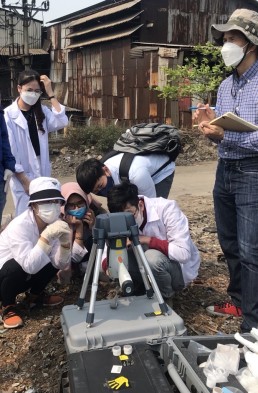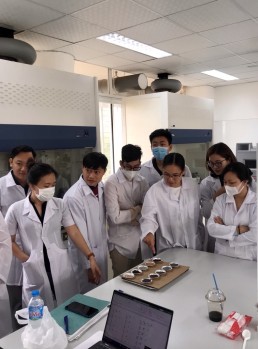
06. March 2023
Many people link soil contamination and Vietnam first and foremost to the environmental and health impacts of Agent Orange use by American troops during the Vietnam War. However, apart from this special case, it is in Vietnam mostly the contamination caused by so-called recycling villages that has a particularly harmful effect on people and the environment. The processing of scrap metals for the production of steel that taking place in these sites often leads to the entry of heavy metals into the soil and (ground) water. Because recycling villages are still widespread in Vietnam, many people and large areas are potentially affected by them.

In Bắc Ninh province, Châu Khê village has been identified as a high risk source of contamination. In early March 2023, the CapaViet3 project team was on site to conduct further measurements and analyses together with Vietnamese experts, and to discuss solutions to protect residents, workers and the environment with local authorities.
The team was supported by 25 experts of environmental analysis from different Vietnamese provinces. They were trained by Prof. Dr. Tim Mansfeldt from the University of Cologne and the UfU team in the use of on-site analysis equipment for heavy metal detection in soils, and examined the waste and slag deposited around the village as part of their practical training.
With mobile x-ray spectrometers, samples could be analyzed directly at the illegal waste dump and in the laboratory. In addition to already known contaminants, a high concentration of lead was identified – a pollutant that is particularly dangerous to the health of children.

These worrying findings show once again how important it is that responsible authorities develop viable and feasible concepts to manage contamination and to secure recycling villages. A first step on the way to a remediation plan for Châu Khê was therefore the remediation workshop conducted by the CapaViet3 project at the 27th and 28th of February 2023. Representatives of environmental, financial and industrial authorities jointly discussed the existing challenges and talked about possible solutions. A presentation of possible remediation technologies is now followed by a prioritization and further elaboration of suitable measures.
The results of the workshops and, above all, the methodology for developing a suitable remediation plan will also be made available to other provinces in Vietnam. This supports public authorities in other provinces –in the management of contamination risks emanating from recycling villages and thus in the protection of the environment and public health.


